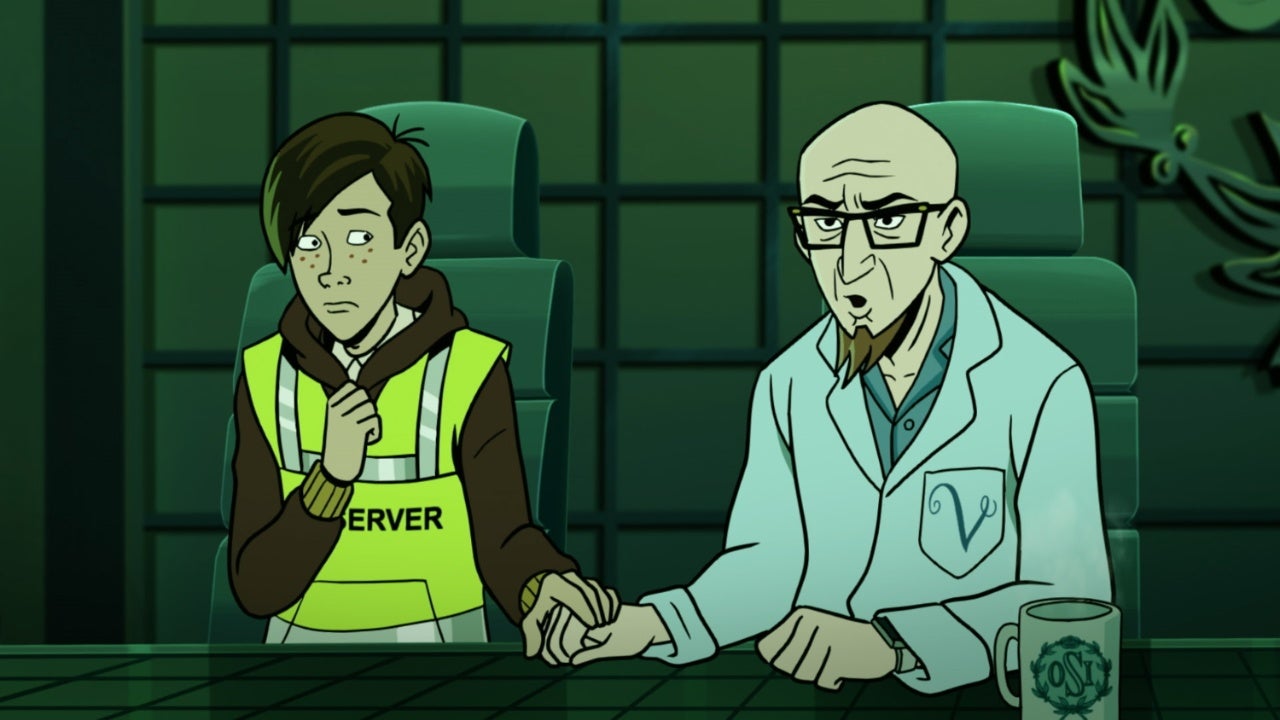Blood
The Venture Bros.: Radiant is the Blood of the Baboon Heart Review
Anyone looking for an epic conclusion from The Venture Bros.: Radiant Is the Blood of the Baboon Heart should look elsewhere. But then, anyone looking for an epic conclusion is most likely watching the wrong show. Venture Bros., the apparently completed Adult Swim series that started life as a mean-spirited riff on Jonny Quest-style adventure-boy heroics before evolving into a nuanced, hilarious study of failure and capes, has always been more interested in the neuroses and petty grudges of its impressively deep ensemble than in delivering anything as conventionally appealing as “good guy punches bad guy.” Series creators and co-writers Jackson Publick and Doc Hammer understand, and appreciate, the appeal of a good old-fashioned costumed brawl, but the show’s genius lay in its ability to keep even the most outlandish plot twists grounded in the peevish insecurities of its leading men. (Nearly all the main characters of Venture Bros. are men or boys or men who act like boys.) The Avengers band together to save the galaxy; the Ventures are too busy selling their monstrous patriarch’s legacy for petty cash.
With all that in mind, it’s difficult to know exactly what The Venture Bros.: Radiant Is the Blood of the Baboon Heart needed to be. How can you twist all the ridiculous lore, endless anticlimaxes, and nightmare Freudian conflicts involving Rusty, Hank, and Dean Venture (and all their assorted hangers on) into a satisfying end? The answer, it turns out, was Publick and Hammer doing what they’ve always done, just a bit more of it. The duo had tried their hands at specials and hour-long episodes in the past, but Baboon Heart is their longest single project for the series to date, and possibly the best thing (for some fans, the only thing) that you can say about it is that it plays exactly like an entry from the original series, only longer. This is not damning with faint praise, either. At 84 minutes, the direct-to-video movie never flags, nor does it ever come across as just half a season crammed into a single overcoat. As genre fans know, turning popular television shows into movies can be a mixed bag, and for every Star Trek II: Wrath of Khan, there are half a dozen X-Files: I Want To Believes. Radiant Is the Blood of the Baboon Heart is some kind of minor miracle, albeit one directed entirely at those already convinced of its divinity.
It’s been nearly five years since Adult Swim aired the last Venture Bros. episode, “The Saphrax Protocol,” and its ending feeds directly into Baboon Heart. Hank Venture (Christopher McCulloch, a.k.a. Publick himself), one half of the sibling pair that gives the show its title, is missing; having caught his brother Dean (Michael Sinterniklaas) sleeping with his girlfriend, Hank has decided to go solo for a while, searching for some kind of self in his deluded, Batman-obsessed way. While a guilt-ridden Dean enlists two-thirds of the supernaturally inclined Order of the Triad to help him find his errant sibling, their father, Rusty Venture (James Urbaniak, at his peevish best), prepares to launch the newest product from Venture Industries. OSI and the Guild of Calamitous Intent investigate a potential rival in the archvillain business, and the Monarch (McCulloch) and Gary (Hammer) make plans to get back to doing what they love: ruining Rusty’s day. Meanwhile, a new player in white enters the scene with mysterious intentions of her own.
Lost yet? If you aren’t a longtime follower of the show, you likely will be, as Baboon Heart makes no effort to catch newcomers up to speed. There isn’t even a “previously on” montage at the start. Which makes sense: The Venture Bros. has always been a cult show dedicated to the highly particular obsessions of a certain kind of old-school nerd (someone into ’80s hip-hop, forgotten Hanna-Barbera cartoons, and Zardoz, say), and any attempt to broaden its appeal would inevitably result in ruining what made it singularly great. Premiering a few years before cinematic superheroes conquered Hollywood, The Venture Bros.’ goofy, cynical, yet somehow loving take on the antics of idiots who manage their personal problems through dress-up and laser guns has only grown more relevant with time, in large part because of its refusal to embrace homogeneity. Publick and Hammer tell the kind of stories they want to tell, and in a modern culture dominated by the (perhaps faltering) Marvel Method, there’s something to be said for embracing comic madness at its most personally idiosyncratic.
Baboon Heart doesn’t transcend its origins; it doesn’t bother trying. The worst that can be said is that it likely won’t change anyone’s mind one way or the other – there’s ambition here, but that ambition is almost entirely in the format itself, and not in the story the script (co-written by Hammer and Publick) tells. Yes, there are answers to most of The Venture Bros.’ long-running questions here, and those answers are, as such things go, solid ones. Most of the major characters get at least a scene or two, yet somehow neither the answers nor the nods ever feel like forced fan service or marking off a checklist. The ending is definitive without being conclusive, and the final post-credits scene, a long-standing show tradition, is as perfectly sweet as The Venture Bros. ever gets. If this really is the end, it’s hard to imagine a more appropriate one.

